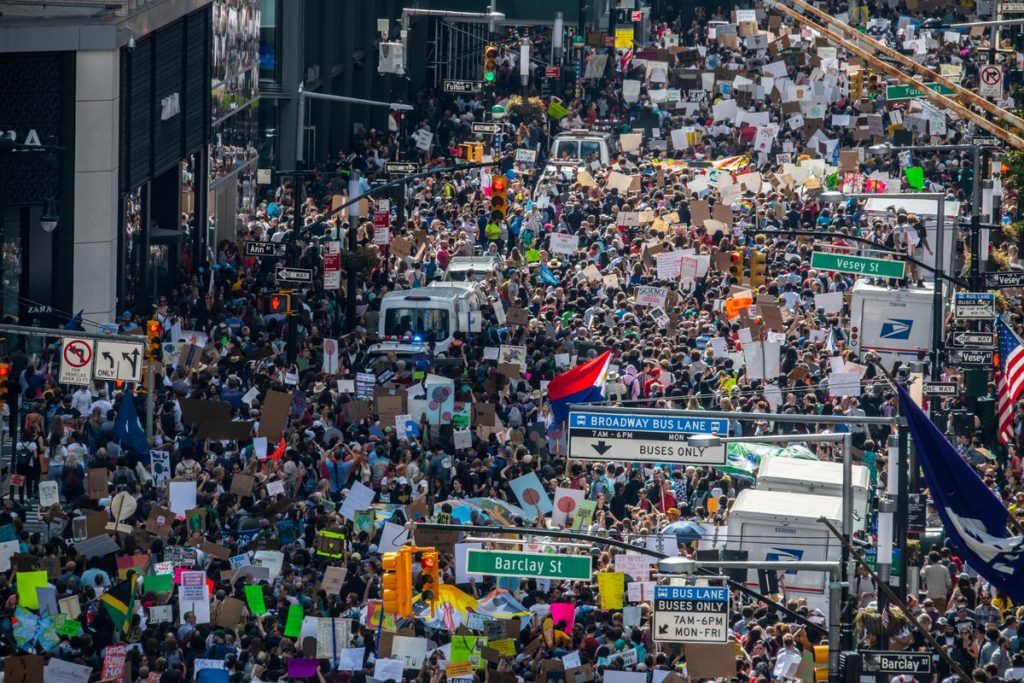Best of 2019: Young experts on nuclear weapons, climate change, and disruptive technology
By Dawn Stover | December 31, 2019
 September 2019 climate strike in New York City. Credit: 350.org
September 2019 climate strike in New York City. Credit: 350.org
When Greta Thunberg was named Time magazine’s Person of the Year, it was just one more sign that young people are increasingly raising their voices on the most important issues of our time. The 16-year-old Swedish climate activist traveled the globe this year (by sailboat, train, and electric car), urging world leaders to do more to stabilize the planet’s climate, with a message so powerful President Trump couldn’t resist mocking her on Twitter. Twice.
Thunberg, who launched her School Strike for Climate last year by camping out in front of the Swedish Parliament, is not alone in her quest. Some four million people joined the global climate strikes in September 2019, including the lead organizers of US Youth Climate Strike, whose piece in the Bulletin was this year’s Leonard M. Rieser Award winner.
In the “Voices of Tomorrow” section of the Bulletin, emerging experts had a lot to say this year about whether nuclear power should be among the solutions to climate change. And it wasn’t just climate change. Our writers also shared their ideas and opinions on topics ranging from the nuclear negotiations with North Korea to the approach of useable quantum computers, dubbed “years to quantum,” or Y2Q for short. Here’s a sampling of some leading emerging voices from the pages of this year’s Bulletin:
Adults won’t take climate change seriously. So we, the youth, are forced to strike.
By Maddy Fernandez, Isra Hirsi, Haven Coleman, and Alexandria Villaseñor
In this heartfelt essay, four American middle- and high-school students explain why they are “fed up with decades of inaction on climate change” and striking to support the Green New Deal. They criticize political leaders, from the Republican president to Democratic senator Dianne Feinstein, for not only delaying urgently needed climate action but also belittling schoolchildren who will have to face the consequences of inaction.
Nuclear power and global climate change
By Ivan Andriushin, Cecilia Eiroa-Lledo, Patricia Schuster, and Evgenii Varseev
This essay, which received the first Honorable Mention in the history of the Bulletin’s Rieser Award, is co-authored by two Americans and two Russians working together as part of the Young Professionals Nuclear Forum established in 2016. “As young professionals beginning our careers,” they write, “we believe strongly that nuclear energy must play a key role in mitigating climate change.” They call for a dramatic increase in the construction of nuclear reactors and explain why Americans and Russians differ significantly in their views on nuclear energy.
Scientific blinders: Learning from the moral failings of Nazi physicists
By Talia Weiss
This thoughtful essay tackles an ethical dilemma shared by scientists and engineers working in a variety of programs, ranging from nuclear modernization and other defense-related research to emerging technologies such as artificial intelligence and gene editing and facial recognition—all of which “hold great promise but might also be used for ill.” Reflecting on the history of talented World War II-era German physicists who did not embrace Nazi policies but nevertheless worked for a secret Nazi nuclear program, the author describes how scientists can become so focused on technical matters that they lose sight of moral ones—and what young job seekers should be asking themselves today.
One step back, two steps forward: Moving on from Hanoi
By Catherine Killough
With North Korea’s end-of-the-year “deadline” for the United States to make meaningful concessions in nuclear talks (an ultimatum the United States is dismissing), and North Korea’s vice minister of foreign affairs promising a “Christmas gift” if there is no progress, it’s a good time to reflect on the February Hanoi Summit—the last time President Trump and North Korean leader Kim Jong-un met. After the summit ended abruptly and without any agreement, this essay criticized media coverage for focusing “overwhelmingly on who is to blame instead of what needs to be done to move US-North Korea diplomacy forward.” The author’s recommendations, still valid, included maintaining the momentum established by summit meetings, “particularly as Trump may be increasingly distracted by the 2020 election and ongoing investigations.”
Approaching Y2Q and barely a peep (or tweet) from the government
By Lindsay Rand
The arrival of quantum computing, a technology that promises to dramatically boost processing capabilities and threatens to undermine data security and privacy, is closer than ever. In October, a group of Google researchers claimed to have achieved “quantum supremacy” by performing a computation millions of times faster than the world’s fastest supercomputer. In this essay, the author argues that although quantum computing has triggered widespread alarm, the US government is ill prepared—and should look to earlier preparations for Y2K as a model for how to identify liabilities and protect critical assets in the face of cyber-disruption.
Together, we make the world safer.
The Bulletin elevates expert voices above the noise. But as an independent nonprofit organization, our operations depend on the support of readers like you. Help us continue to deliver quality journalism that holds leaders accountable. Your support of our work at any level is important. In return, we promise our coverage will be understandable, influential, vigilant, solution-oriented, and fair-minded. Together we can make a difference.
Keywords: best of 2019
Topics: Climate Change, Disruptive Technologies, Nuclear Risk














